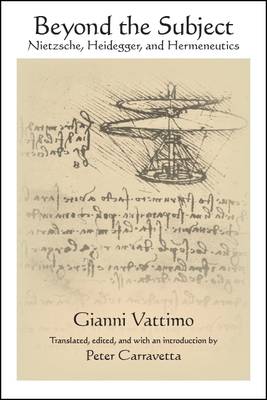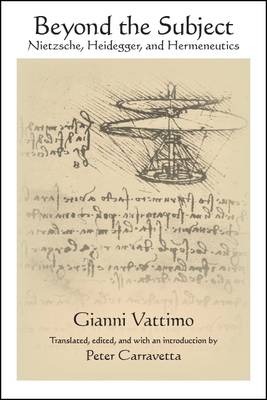
- Afhalen na 1 uur in een winkel met voorraad
- Gratis thuislevering in België vanaf € 30
- Ruim aanbod met 7 miljoen producten
- Afhalen na 1 uur in een winkel met voorraad
- Gratis thuislevering in België vanaf € 30
- Ruim aanbod met 7 miljoen producten
Zoeken
€ 151,45
+ 302 punten
Uitvoering
Omschrijving
In Beyond the Subject Gianni Vattimo offers a reading of Nietzsche and Heidegger that shows how the premises to overcome the metaphysical Subject were already embedded in their thought. Vattimo makes a case for a Nietzsche who is not concerned with the structure and glorification of the Overman, but rather with its opposite, by showing how it is the single individual who must see and accept his/her potential and then excel and develop an inner strength and ethic. He reads Heidegger as concerned with the inevitable distortion present in every interpretation, which, when confronted and accepted, humbles us to deal with a less overarching telos or Grund, and makes us more attuned to contingency and interpersonal communication--what Vattimo calls a "weakened" notion of being. These original readings of Nietzsche and Heidegger pave the way for Vattimo's concept of weak thought and open up to a future social ethic that is less agonistic and more community oriented. This edition includes two supplementary essays from 1986 and 1988 that expand on the same themes, providing a deeper look at an important decade in the development of Vattimo's thought.
Specificaties
Betrokkenen
- Auteur(s):
- Vertaler(s):
- Uitgeverij:
Inhoud
- Aantal bladzijden:
- 156
- Taal:
- Engels
- Reeks:
Eigenschappen
- Productcode (EAN):
- 9781438473819
- Verschijningsdatum:
- 1/09/2019
- Uitvoering:
- Hardcover
- Formaat:
- Genaaid
- Afmetingen:
- 150 mm x 231 mm
- Gewicht:
- 317 g

Alleen bij Standaard Boekhandel
+ 302 punten op je klantenkaart van Standaard Boekhandel
Beoordelingen
We publiceren alleen reviews die voldoen aan de voorwaarden voor reviews. Bekijk onze voorwaarden voor reviews.











